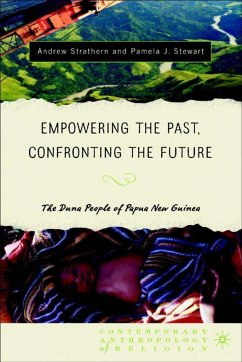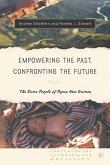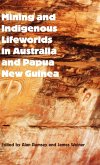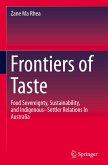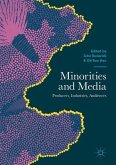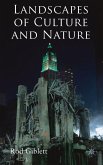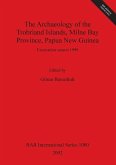How have the Aluni Valley Duna people of Papua New Guinea responded to the challenges of colonial and post-colonial changes that have entered their lifeworld since the middle of the Twentieth-Century? Living in a corner of the world influenced by mining companies but relatively neglected in terms of government-sponsored development, these people have dealt creatively with forces of change by redeploying their own mythological themes about the cosmos in order to make claims on outside corporations and by subtly combining features of their customary practices with forms of Christianity, attempting to empower their past as a means of confronting the future.
Hinweis: Dieser Artikel kann nur an eine deutsche Lieferadresse ausgeliefert werden.
Hinweis: Dieser Artikel kann nur an eine deutsche Lieferadresse ausgeliefert werden.
"This accessibly written book is a very welcome addition to the literature on the Papua New Guinea highlands. It is refreshingly free of jargon, written in a highly readable style but, drawing on the authors' enormous fund of experience, evidencing considerable anthropological depth and awareness. The focus is on issues of change and the book adopts a welcome commonsense perspective balancing between the timeless ideas of tradition - seen not as static but a constantly shifting perspective - and modernity - seen not as globalizing similarity but as a pluralizing process. It has a particular interest in ritual responses to change that are prominent in Duna culture, presenting some fascinating ethnography on these issues. The book will also appeal to those interested in ideas about the constitution of highland New Guinea social groups, from the early debate on the relevance of African models - to which one of the authors made prominent contributions - to today's concerns with the flexibility of these local entities." - Paul Sillitoe, Head of Anthropology Department, University of Durham
"The authors' familiarity with and extensive publications on Duna culture and society provide a 'sufficient ethnography' from which emerges this nuanced account of the forces of change in a contemporary Papua New Guinean society. This ethnography uncommonly privileges the reader with insights into the choices, and their often unintended consequences, made by Duna men and women as they grapple with tradition that is not fixed but constantly shifting, and modernity that is pluralizing rather than homogenizing. The authors capture the texture, ironies and complexities of Duna society while critically challenging the idea of 'modernity' as a meta-narrative and explanatory concept in anthropology and the social sciences generally. Highly recommended." - Naomi McPherson, Chair of Department of Anthropology, Okanagan University College, Kelowna, Canada
"The Aluni Valley Duna of Papua New Guinea's Southern Highlands, despite considerable isolation, have been subject to a complex web of economic, political, social, and religious pressures owing to their colonial experience and the encroachment of global capitalism. In an effort to come to terms with their changed circumstances Duna draw upon - and at the same time have reshaped - their history and culture in myriad ingenious ways. Empowering the Past is at once a fine-grained ethnography of a small, remote community and a sophisticated comparative study by two of our era's most prolific anthropological researchers. By presenting valuable insights in elegant, yet accessible prose, Strathern and Stewart have created a book that should command wide attention among scholars interested in Pacific studies, anthropological theory, globalization, change, development, and politics of culture and tradition." - Richard Feinberg, Professor of Anthropology, Kent State University
"Observation and insight shine through this portrait of change in a Southern Highlands valley in New Guinea at the edge - roads came there but briefly. Strathern and Stewart reveal a politics of tradition seen always in relation to a moving present. They show how misleading easy dichotomies are, how each community must make sense of a particular shifting mix of events, myth, hopes and experience. They also explore four distinct New Guinea modernities in an illuminating chapter of comparison. To find anthropological findings and ideas so clearly discussed as here is a great pleasure." - Gilbert Lewis, St John's College, Cambridge
"The authors' familiarity with and extensive publications on Duna culture and society provide a 'sufficient ethnography' from which emerges this nuanced account of the forces of change in a contemporary Papua New Guinean society. This ethnography uncommonly privileges the reader with insights into the choices, and their often unintended consequences, made by Duna men and women as they grapple with tradition that is not fixed but constantly shifting, and modernity that is pluralizing rather than homogenizing. The authors capture the texture, ironies and complexities of Duna society while critically challenging the idea of 'modernity' as a meta-narrative and explanatory concept in anthropology and the social sciences generally. Highly recommended." - Naomi McPherson, Chair of Department of Anthropology, Okanagan University College, Kelowna, Canada
"The Aluni Valley Duna of Papua New Guinea's Southern Highlands, despite considerable isolation, have been subject to a complex web of economic, political, social, and religious pressures owing to their colonial experience and the encroachment of global capitalism. In an effort to come to terms with their changed circumstances Duna draw upon - and at the same time have reshaped - their history and culture in myriad ingenious ways. Empowering the Past is at once a fine-grained ethnography of a small, remote community and a sophisticated comparative study by two of our era's most prolific anthropological researchers. By presenting valuable insights in elegant, yet accessible prose, Strathern and Stewart have created a book that should command wide attention among scholars interested in Pacific studies, anthropological theory, globalization, change, development, and politics of culture and tradition." - Richard Feinberg, Professor of Anthropology, Kent State University
"Observation and insight shine through this portrait of change in a Southern Highlands valley in New Guinea at the edge - roads came there but briefly. Strathern and Stewart reveal a politics of tradition seen always in relation to a moving present. They show how misleading easy dichotomies are, how each community must make sense of a particular shifting mix of events, myth, hopes and experience. They also explore four distinct New Guinea modernities in an illuminating chapter of comparison. To find anthropological findings and ideas so clearly discussed as here is a great pleasure." - Gilbert Lewis, St John's College, Cambridge

